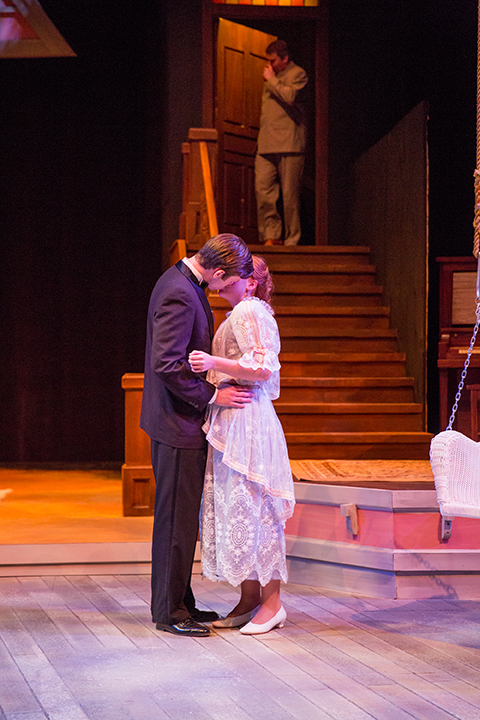Baylor Theatre presents “The Story of a Marriage,” directed by Marion Castleberry, professor of theater arts, beginning today.
The performance includes three plays, “Courtship,” “On Valentine’s Day” and “1918,” which are the central plays of “The Orphans’ Home Cycle.” The original work consists of nine plays and focuses on playwright Horton Foote’s father and his parents’ marriage in 20th century Texas.
Starting at 10:30 a.m. Saturday in Mabee Theatre, Baylor Theatre will also stage readings of all nine plays in “The Orphans’ Home Cycle.” Baylor alumni, faculty and students will read the plays in sequence for the first staging of its kind ever to take place in Texas. The readings will bookend a 5 p.m. stage performance of “Story of a Marriage.”
Many of Foote’s plays, including those in “The Orphans’ Home Cycle,” take place in his native Texas. Much of his work is set in 20th century Texas history, drawing on his own family’s history.
Baylor Theatre gave Foote its dramatist title in 2002, and the playwright taught regular sessions at the university before passing away in 2009. He was the recipient of a large number of awards, including an Academy Award for his screenplays for “To Kill a Mockingbird” and “Tender Mercies.” He also received a Pulitzer Prize for “The Young Man from Atlanta.”
Castleberry has dedicated himself as the founding president of the Horton Foote Society and as co-founder of the Horton Foote American Playwrights Festival. He also wrote a biography of the playwright, who was Castleberry’s personal friend and mentor, titled “Blessed Assurance: The Life and Art of Horton Foote.”
“He is perhaps one of, at least in our state, the greatest playwrights and one of the world’s greatest playwrights,” Castleberry said.
Heath junior Meredith Bennett stars as Elizabeth Vaughn-Robedaux in the play. Her character is a young girl who defies her parents by marrying a man of whom they don’t approve. The play continues to follow the pair’s marriage and their struggles as a young couple.
“There’s a lot of big decisions that happen in your early 20s, and although hers are a little different because of the time period, I think it’s totally relatable nowadays because we have a lot of big decisions to make when we graduate college and move to other cities or try to get a job,” Bennett said.
Bennett feels that the play is relatable to everyone regardless of where they’re from or what they’ve been through.
“You don’t see these big awful things happen on stage, but you see the way that they affect people and they affect normal people,” Bennett said. “It takes something that seems very simple and makes it extremely relatable to just about everyone, even if you didn’t grow up in Texas.”
Castleberry said one of the largest challenges the actors faced was portraying the emotions of a bygone time.
“They emotionally have to believe and make us all believe that they are going through the hardships right now at the very moment. We call that living in the moment,” Castleberry said. “A lot of people don’t realize how much work goes into it. It’s very demanding, especially on young actors, to get them to the point where they fully understand the material.”
Concord, N.C., graduate student Heidi Breeden, who is working toward her master’s in directing and teaches theater appreciation, believes that it is important for students to see plays like “The Story of a Marriage.”
“We often see things that are big and flashy and bright, but sometimes seeing a real test of the acting skill of an actor, we get to appreciate more what they are doing every day and what they are working on as far as a major course of study,” Breeden said. “I think these stories are important for Texans, especially because Texas history is so rich and so exciting, but we often don’t notice it. We don’t recognize it because it’s understated.”





